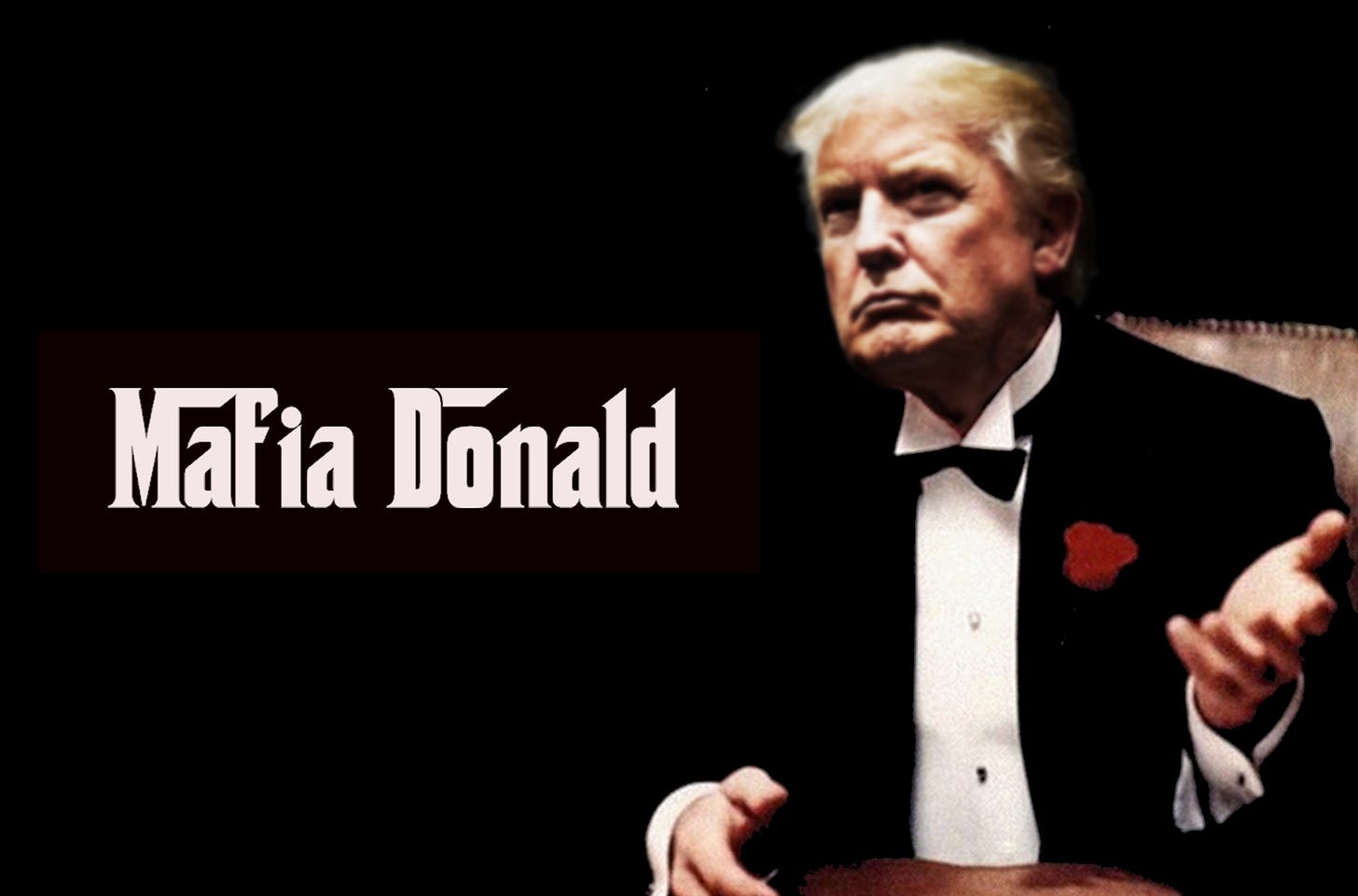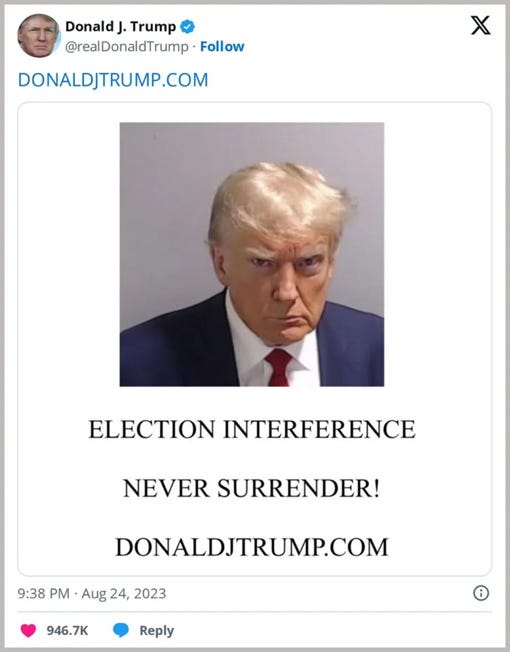To talk about Trump is to promote him, but there are exceptions to every rule. His arrests are legitimate news. How do we talk about him without helping him? Don’t refute his claims. Reframe him as a habitual criminal. He is the boss of his own mafia. He steals to get what he wants, even the presidency, and his political ambitions are to expand his crime family into a full-fledged kleptocracy.
NOTE: I am heading back to Virginia at the end of this week to assist with the state and local elections and to conduct messaging workshops across the state. I will let you know when I have firm dates and locations. Please let me know if you are interested in hosting a workshop or helping to host one, are working with a candidate who needs communications advising or debate prep, or just want to get lunch or something! Thanks!
Reframing Trump
WYSIWYG
If you follow the neuroscience of the public debate (or have taken one of my workshops) you know that “what you say is what you get.” Whatever gets talked about the most is what becomes normalized and eventually dominates people’s brains. That is why I usually advise against talking about what Trump does and says.
Unfortunately, with the flood of legal news, we don’t really have any choice. So, if we must talk about Trump, let’s do it right. Rather than falling into his traps or venting our frustration with petty insults, let’s reframe the debate.
Donald Trump has spent his entire life framing himself as the epitome of the successful businessman and billionaire. Now he frames himself as champion of the working man and victim of a campaign by Democrats and President Biden to persecute him as their political opponent.
People need a way to make sense of what they observe and experience. Too many people believe Trump’s story about himself, partly because we haven’t provided a different story, one that actually explains his behavior from our perspective.
We can reframe Donald Trump as a habitual criminal and crime boss. Donald Trump’s whole life has been about the pursuit of money. We can reframe that whole life as evidence, not of his talent, but of his boundless greed and willingness to stop at nothing in his pursuit of personal wealth.
Our challenge is to use the fact that Trump is in the news, not to give more press to his depiction of the situation, but to draw attention to our depiction of the situation, to help us deliver our version of events to the persuadable voting public.
Thank you for reading Reframing America, a newsletter about helping the Left learn how to stand up to the Right in the public debate! This is a reader-supported publication. To receive new posts by email please consider becoming a subscriber. All content is free, but some people choose to become paying subscribers to support our mission.
What Not to Do
Do not repeat the term “election interference.”
Trump only needs two words to claim that President Biden is having his political opponent arrested. These words force our brains to draw parallels to countries in which dictators actually do that. If we use the term “election interference,” even to talk about why this situation has nothing to do with it, it has the same effect on people’s brains: creating and reinforcing the very association we are trying to refute.
I have mixed feelings about sharing the mug shot.
Trump knows what he is doing. This facial expression is communicating a call to action for his supporters and a threat to everyone else. Personally, I don’t really want more people exposed to it. I might feel differently if it were a classic mug shot with the lines and the side view, but this one is downright disturbing.
Do not talk about Trump lying about his weight.
Yes, we know Trump lies. Pointing out this lie only serves to humanize his lying, to remind people that everybody does it sometimes. When we do this, we are seen as name calling or even fat shaming.
How to Reframe the Trump Debate
Step 1: What are we trying to communicate?
What is our point of view?
Our message:
Donald Trump is a career criminal. His recent crimes are part of a life-long history of criminal behavior. His family business has always been a fundamentally criminal enterprise. He thinks nothing of breaking the law to get whatever he wants, whether that means sexual assault, committing fraud or stealing the presidential election.
He doesn’t care about anyone but himself. He seeks power, adoration and loyalty and uses them to extract money. He used his office to enrich his family and uses his campaigns to rake in money. His political ambitions are all about elevating his grift to the biggest possible scale, to be an oligarch/kleptocrat like Putin.
Step 2: What “frame of reference” would communicate that message?
What single idea would provide a context that would get people to see the entire debate from that point of view?
In this case, “mafia” would be a productive frame of reference. Everybody knows about mafias. Everybody knows that mafias are criminal enterprises for the purpose of making money. Everybody knows that mafia bosses are bad guys who amass power, demand total fealty, threaten violence, use others to do their dirty work and so on.
Step 3: What phrasing can we use to make the connection?
What words or phrases could we use to quickly and subconsciously cause people to associate Donald Trump with the mafia frame of reference?
Mafia bosses are called mafia “dons” which suggests the term “Mafia Donald.” Calling Trump “Mafia Donald” is a quick and dirty way to make that connection. We can even use the “Trump Crime Family.” Trump tried to project that term onto the Bidens, but the comparison only makes him look infinitely worse. There may be other phrases or even better ones. All that matters is that they connect Donald Trump to the concept of the mafia and organized crime.
Step 4: What is our narrative?
We tell stories to establish the initial connection, to explain how they fit together and to create many opportunities to repeat and reinforce those connections.
“Donald Trump = Mafia Boss” is a fruitful metaphor. It allows us to create a narrative with a lot of explanatory power. There are so many parallels between Trump’s behavior and the behavior of mafia bosses that it has the potential to make more sense of what people are seeing and experiencing about Trump than the narratives that he promotes about himself.
What to Say
How do we weave the narrative of Mafia Donald? We tell stories about the history of Trump as the boss of an extensive criminal enterprise and his ambitions to be a kleptocrat like Putin.
We should, of course, talk about the actual charges he is facing in his many court cases, such as the fact that Donald Trump was arrested on charges of violating the Espionage Act, racketeering, and leading a criminal conspiracy to steal the 2020 Presidential election and defraud the voters of the United States.
We just need to relentlessly place those charges into the context of his life-long history of criminal behavior.
Potential Storylines:
Donald Trump is a “Mafia Don,” the boss of a mafia-like crime family and criminal syndicate of hundreds of organizations that regularly engage in fraud, deception, and tax evasion. (See Trump University, Trump Foundation, Trump Organization.)
Donald Trump’s criminal behavior now is part of a life-long pattern of criminal behavior. The only difference is that this time, he is being held accountable. He can’t threaten to bankrupt the U.S. government with nuisance lawsuits, so he’s attacking the prosecutors and judges instead.
His motivation has always been money. His methods have always been deception, fraud, and extortion. He made money by lying to investors, banks and to the government and by defrauding his workers and contractors. He is a terrible businessman, and not even that good of a criminal.
Trump used the power of his office to solicit bribes and make money for himself and his family. He lies to his loyal supporters, using his campaigns and legal problems to con them out of their hard-earned money. His refusal to accept his loss in 2020 is just another con job.
His political ambitions are to become an oligarch and kleptocrat like Vladimir Putin, to turn America into a “mafia state” like Putin’s Russia: to escalate his grift to a global scale and use the power of the Presidency to crush anyone who gets in his way.
Trump doesn’t care about anyone but himself. Like a Mafia Don, Donald Trump demands total loyalty but is loyal to no-one. He gets people to do his dirty work for him and then hangs them out to dry if they get caught, like the Jan 6 defendants and his many lawyers.
Key words and phrases:
Life-long history of criminal behavior. Career criminal. Habitual/serial offender. Crime boss. Mafia Don. Mafia Donald. Trump crime family. Organized crime. Persistent pattern of financial fraud. Steal the presidential election. Violation of the Espionage Act. Leader of a criminal conspiracy. Defraud the people of the United States. Culture of criminality.
Racketeering. Witness tampering. Obstruction of justice. Seditious conspiracy. Espionage. Theft of classified documents. Fraud. Deception. Tax evasion. Money laundering. Soliciting bribes. Extortion. Hush-money. Sexual assault.
Deliberately provocative questions:
Don’t make claims. Just ask questions. Sometimes you have to say controversial things to get people to pay attention. That said, these are legitimate questions to ask.
How many of his associates and supporters have been found guilty of crimes while doing his bidding?
How much did Trump’s family businesses make from foreign countries during his presidency?
Why did Trump want so many top secret national security documents? Did he show them to enemies of our country? if so, what did he get in return?
Why did the Saudis give Jared Kushner $2 billion? Was it a payoff for letting them off the hook for killing a Washington Post reporter?
Did Trump launder money through his real estate business in exchange for billions in loans from Deutsche Bank?
What did he say to Vladimir Putin?
The Bottom Line
Stop reacting to every obnoxious thing Donald Trump says or does. Stop calling names. Talk less about Trump’s character defects and more about his life-long pattern of criminal behavior. Lying is a character defect. Fraud is a crime. Being sexist and misogynist are character defects. Sexual assault is a crime.
Let’s keep the American voters’ attention focused on the fact that Donald Trump is now, and has always been, a habitual criminal: a man with boundless greed and total disregard for the law and other people.
Thanks, as always, for reading and subscribing! I hope you are able to use this in your work and your activism!
In solidarity,
Antonia






